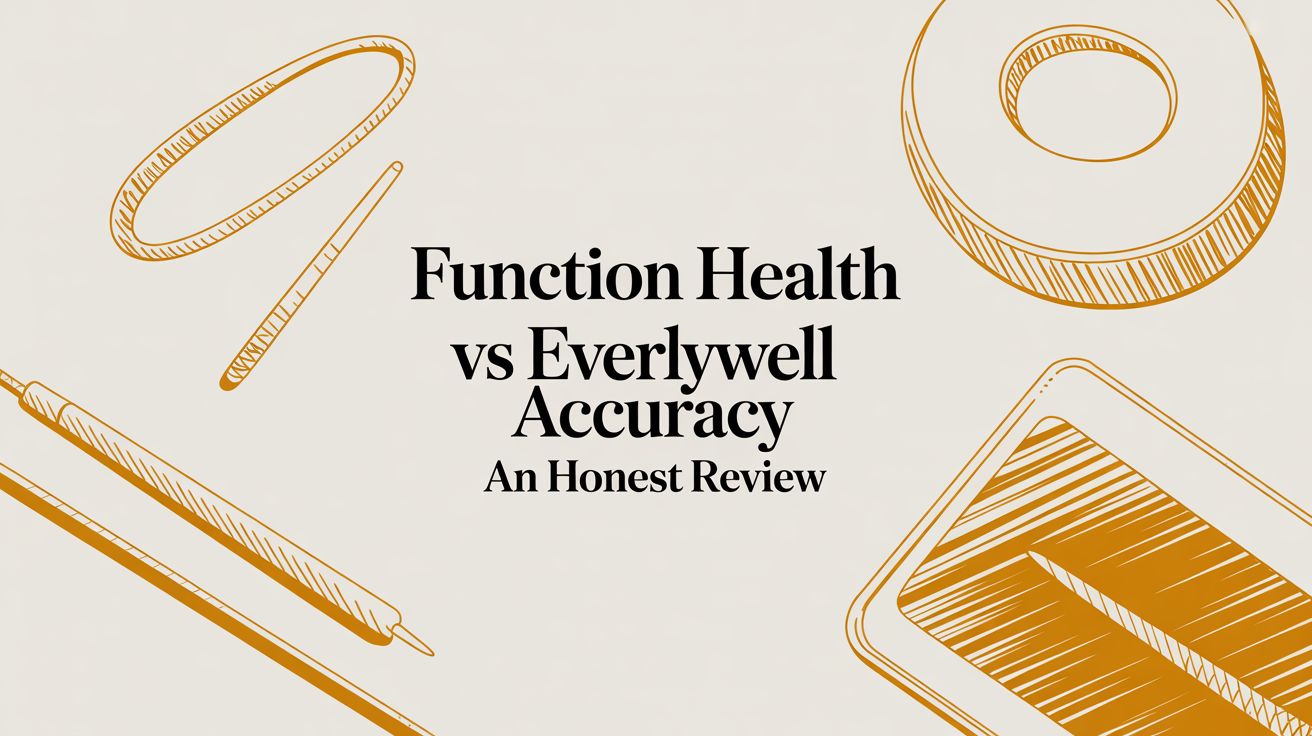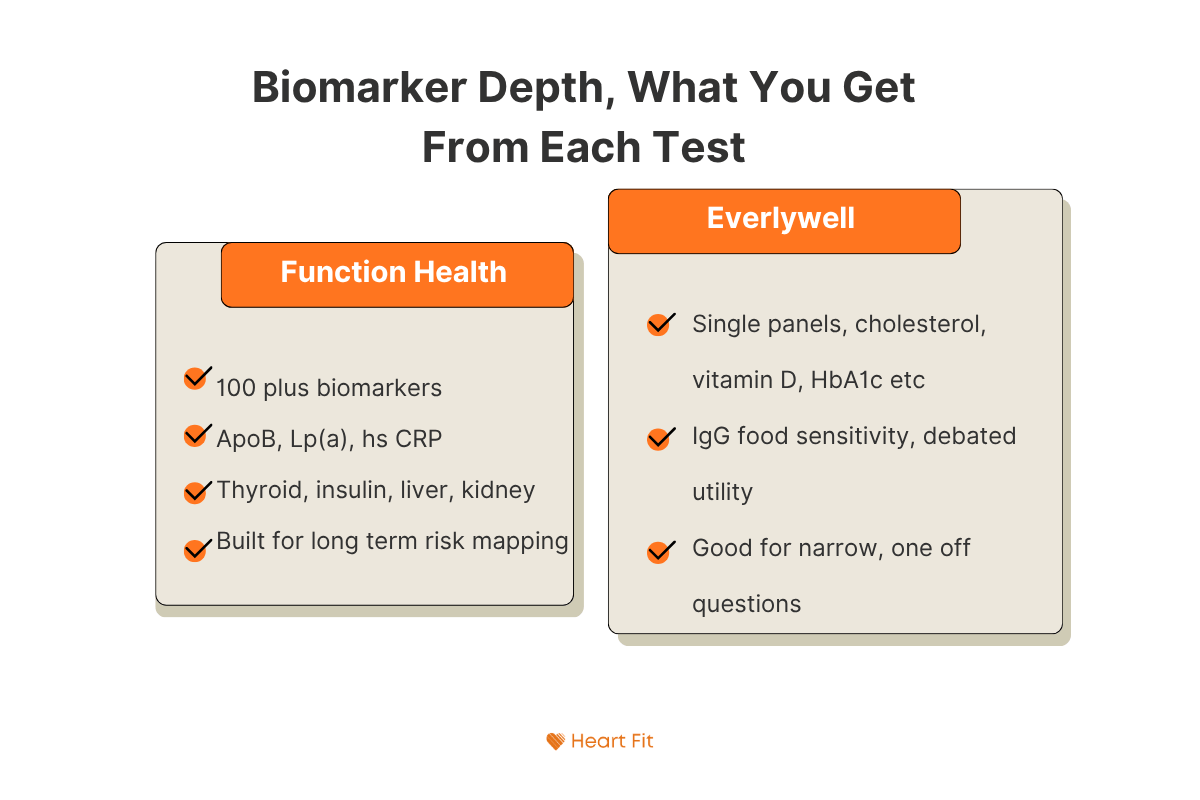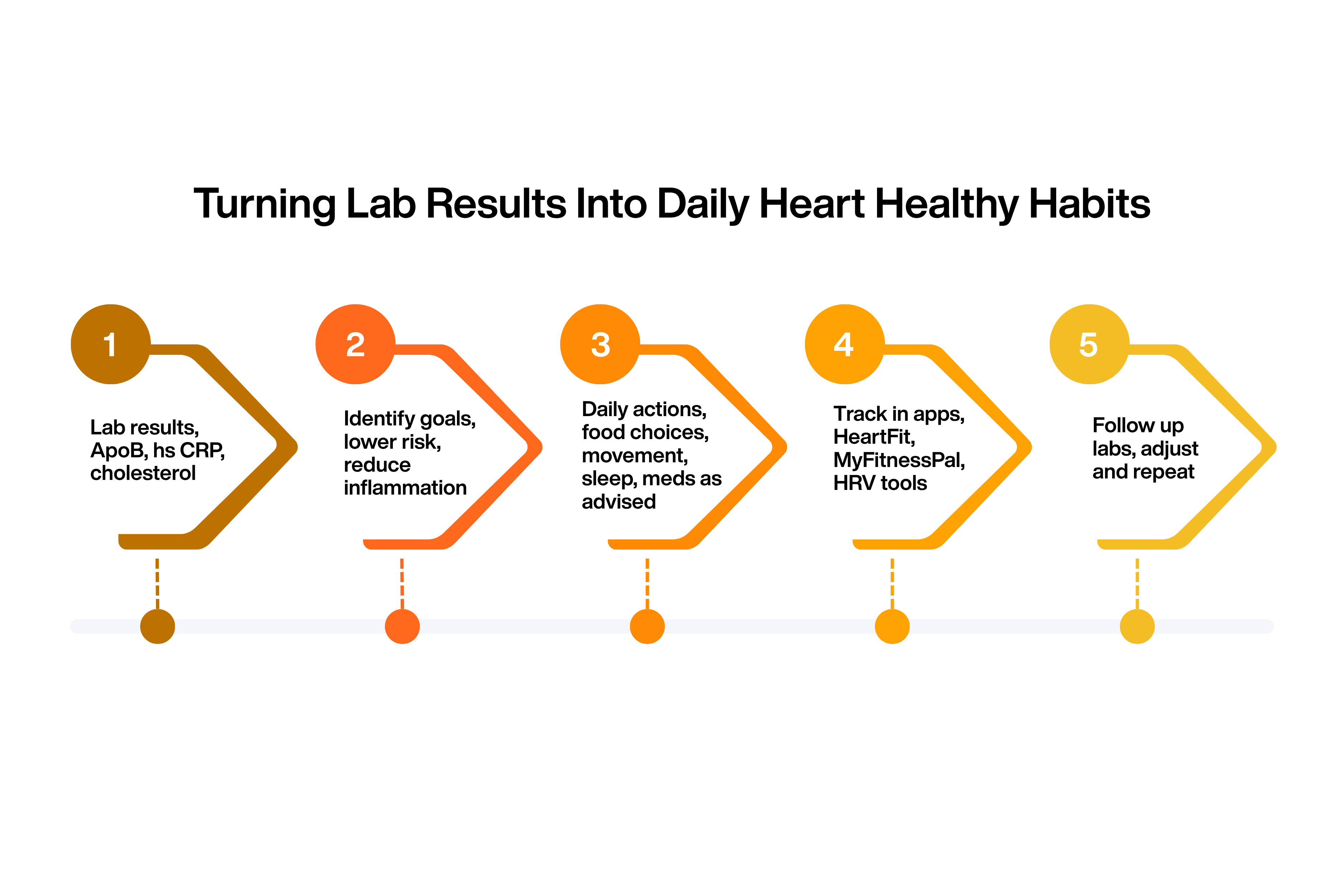Comparing Function Health vs Everlywell accuracy. We analyze lab methods, biomarker depth, and sample collection to see which test is truly reliable.

When you're trying to figure out which at-home health test is more accurate, the conversation around Function Health vs Everlywell accuracy really boils down to two things: how the sample is collected and how deep the analysis goes.
Function Health goes for a professional venous blood draw to run its massive 100+ marker panel. Everlywell, on the other hand, centers its model around at-home finger-prick tests designed for more targeted, symptom-specific questions.
Disclaimer: This article is for informational purposes only and is not a substitute for professional medical advice. Please consult with a qualified healthcare provider before making any lifestyle or medication changes or using at-home health tests.
When we talk about "accuracy" in health testing, it’s not as simple as a single percentage. There are a couple of layers to peel back to understand what you're really getting. You have to consider both clinical accuracy and clinical utility.
This is where Function Health and Everlywell diverge. They both operate in the same space, but their approaches are fundamentally different. Grasping these differences is the key to deciding which service is right for your goals.
To make a smart choice, you need to look at what's under the hood. Here are the core components that dictate reliability:
To put it simply, the choice between these two comes down to what you're trying to achieve. Here’s a quick table to break down the core differences that impact accuracy and the depth of your results.
Comparison PointFunction HealthEverlywellPrimary Sample MethodProfessional Venous Blood DrawAt-Home Finger-Prick (Dried Blood Spot)Biomarker ScopeComprehensive (100+ Markers)Targeted (Specific Panels)Core FocusProactive Health & Early DetectionSymptom-Specific Testing & ConvenienceLab CertificationCLIA & CAP CertifiedCLIA Certified
Ultimately, one focuses on a deep, proactive health baseline powered by a traditional lab draw, while the other prioritizes convenient, targeted answers to specific health questions you might have right now.
.png)
The real value you get from a health test isn't just one number on a page; it's about the depth of the data and whether it’s scientifically solid enough to guide your long-term health. This is where Function Health and Everlywell really part ways. One gives you a comprehensive map of your body's systems, while the other offers a street-level view of a single problem.
Function Health is all about casting a wide net. It kicks things off by analyzing over 100 biomarkers, giving you a deep, system-wide look at your health. The panel includes advanced markers like Apolipoprotein B (ApoB)—which the American Heart Association states is a highly accurate measure of "bad" cholesterol particles—and Lipoprotein(a), or Lp(a), a key genetic risk factor for heart disease.

By looking for these less common but highly predictive markers, the goal is to spot subtle risk factors long before you'd ever feel symptoms. This broad dataset is designed to shift you from reactive, symptom-based thinking to a truly proactive health strategy.
Everlywell, on the other hand, operates on a much more focused, à la carte model. Their tests are designed to answer a very specific question you might have, like "What are my cholesterol levels?" or "Am I low on Vitamin D?" This can be convenient and affordable if you have a single, targeted concern.
But a crucial point in the Function Health vs Everlywell accuracy discussion goes beyond just lab precision; it’s about the scientific validity of the tests themselves. Everlywell’s popular IgG Food Sensitivity Test is a perfect example.
According to the American Academy of Allergy, Asthma & Immunology (AAAAI), IgG testing is not recommended for diagnosing food allergies or sensitivities. They explain that the presence of IgG antibodies likely indicates exposure to a food, not a true intolerance causing symptoms. This underscores the importance of choosing tests with strong clinical backing from respected institutions like the Mayo Clinic or NHS.
The sheer volume and type of data from each service lead to very different outcomes. Function Health’s panel is built to connect the dots between different body systems—for instance, linking inflammatory markers directly to your cardiovascular risk. Function Health digs into over 100 biomarkers initially and around 60 in follow-ups across more than 20 health categories. In contrast, Everlywell’s most popular test checks IgG reactivity to 96 foods, while its other tests cover mainstream markers you’d find in any routine lab work.
This deep-dive approach provides a much richer dataset for spotting the earliest signs of dysfunction. For a closer look at how comprehensive testing services stack up, you might want to read our guide on Function Health vs Mito Health.
A lab test is only as good as the sample it analyzes. When we're digging into Function Health vs Everlywell accuracy, the journey your blood takes from your body to the lab is a huge—and often overlooked—part of the story. While both companies use labs that meet high federal standards, their very different collection methods introduce variables that can affect your results.

Function Health builds its entire process around the clinical gold standard: a venous blood draw. This means a trained phlebotomist collects blood directly from a vein in your arm at a certified lab partner, like Quest Diagnostics. The whole point of this method is to minimize what experts call "pre-analytical errors"—basically, any mistake that can happen before your sample even gets to the machine.
A venous draw gives the lab a larger, more stable blood sample, which is non-negotiable when you're running a massive panel of over 100 biomarkers like Function does. The advantages here are clear:
Everlywell, on the other hand, bets on convenience with its at-home finger-prick (dried blood spot) kits. While these samples are still processed in CLIA-certified labs, the collection process is entirely up to you, which opens the door to potential points of failure.
According to the Centers for Disease Control and Prevention (CDC), CLIA regulations ensure labs meet quality standards for testing accuracy, reliability, and timeliness.
These standards, however, don't and can't control how well you collect the sample at your kitchen table.
A study published in a journal available via the National Institutes of Health (NIH) points out that while dried blood spot testing is valuable, factors like improper collection technique, environmental exposure, and incorrect sample volume can all impact the accuracy of certain measurements when compared to venous samples.
This means that while the lab's analysis might be perfectly accurate for the sample it receives, that sample might not be a perfect snapshot of your blood's true chemistry due to collection errors.
Disclaimer: This article is for informational purposes only and is not a substitute for professional medical advice. Always consult a healthcare provider before making lifestyle or medication changes.
Lab certifications and collection methods are one thing, but the true test of accuracy comes down to clinical relevance and what actual users are experiencing. This is where the Function Health vs Everlywell accuracy discussion gets interesting, especially when you look at some of Everlywell’s most popular—and scientifically debated—tests.
Take their flagship Food Sensitivity Test. While the lab process measuring IgG antibodies might be technically sound, its clinical usefulness is a significant point of contention. As previously mentioned, major organizations like the American Academy of Allergy, Asthma & Immunology (AAAAI) do not recommend IgG testing for diagnosing food sensitivities.
This is where Everlywell's accuracy claims run into trouble. Their widely advertised Food Sensitivity Test, which checks IgG reactivity to 96 foods, is built on a method that many experts believe has weak clinical validation for its intended purpose.
Everlywell itself notes that many of its tests are laboratory-developed tests (LDTs), which do not require FDA clearance before being offered. When you look at user reviews, you'll often see people saying the results felt generic or didn't provide clear, actionable steps.
Function Health operates on a completely different model. Their tests are built on biomarkers that are the gold standard in clinical practice—things like ApoB, hs-CRP (a marker for inflammation), and a complete thyroid panel. For Function, the accuracy question isn't about whether the markers are valid; they are. The challenge shifts from "Is this test legitimate?" to "What does all this mean when you put it together?"
When you comb through verified user reviews for both companies, two very different pictures emerge.
Getting your results back from Function Health or Everlywell is a great first step, but it’s just that—a first step. The real magic happens when you turn those numbers into small, consistent actions that protect your heart for the long haul.
This is especially true for the kind of advanced heart markers you get from a service like Function Health. They test for things like Apolipoprotein B (ApoB). As the American Heart Association notes, many experts consider ApoB a more accurate predictor of arterial plaque than LDL cholesterol alone. Another is high-sensitivity C-reactive protein (hs-CRP), a marker for inflammation and a key driver of future heart problems. Knowing these numbers is critical for a proactive approach.
Okay, so you found out your ApoB is high. What does that mean for dinner tonight? There's a huge gap between seeing a number on a page and knowing how to change it. That’s where habit-building tools come into play.
Here are some of the best heart healthy apps and habit tracking apps to help you connect your lab data to your everyday life:
The screenshot below gives you a peek at how HeartFit makes tracking your food and supplements feel simple and engaging, not like a chore.
This kind of visual feedback helps you stay on track, turning abstract lab data into small, daily wins.
The best test is the one that actually helps you make lasting, positive changes. When you pair your lab results with a dedicated app, you create a powerful feedback loop, connecting your daily choices directly to your long-term heart health.
Disclaimer: This article is for informational purposes only and is not a substitute for professional medical advice. Always consult a healthcare provider before making lifestyle or medication changes.
So, how do you decide between Function Health and Everlywell? It really boils down to what you're trying to accomplish. The debate over Function Health vs Everlywell accuracy isn't about one being universally "better" than the other; it's about picking the right tool for the job.
If your main goal is to get a truly preventative look under the hood—understanding how all your body's systems are working together—then Function Health is the way to go. With its massive panel of 100+ biomarkers and reliance on professional venous blood draws, it gives you a robust dataset built for spotting subtle risks early.
On the other hand, if you just have a single, nagging health question and want a convenient, affordable answer—like checking your Vitamin D or HbA1c levels—Everlywell's focused tests will get the job done. The key is to stick to their tests that measure well-established biomarkers and be cautious with any that have more debated clinical value. For a different angle on comprehensive testing, see our breakdown of Function Health vs Inside Tracker pricing.
Think of it like this: gathering your lab data is just the first step. The real goal is turning that information into actionable insights and healthier habits. This diagram shows how that process should work.
Whether you start with Function Health or Everlywell, the ideal path is the same: translate that data into daily actions that lead to better long-term health outcomes.
No matter which service you choose, the most important step is always discussing the results with your doctor. These tests provide data points, not a diagnosis. A healthcare professional can put the numbers into the context of your complete health picture, making sure any decisions you make are both safe and effective.
When you're comparing services like Function Health and Everlywell, a few key questions always come up, especially around accuracy. Let's tackle the most common ones.
Yes, a venous blood draw—the kind done by a phlebotomist at a lab—is still the clinical gold standard. It comes down to avoiding what experts call "pre-analytical errors." A finger-prick test, while convenient, opens the door to tiny mistakes like skin contamination or insufficient sample volume that can skew the numbers. According to a study published via the National Institutes of Health (NIH), a professional draw minimizes these risks, providing a cleaner, more reliable sample from the start.
Generally, no. The medical community does not typically use IgG testing to diagnose food sensitivities. Leading organizations like the American Academy of Allergy, Asthma & Immunology (AAAAI) are clear: IgG antibodies simply show you've been exposed to a food, not that you're intolerant or allergic to it. Because of this, most doctors and allergists don't find these results clinically useful for guiding major dietary changes.
Absolutely not. These tests are built for wellness monitoring and providing health insights, not for diagnosing diseases. The FDA has not cleared most of these direct-to-consumer tests for diagnostic purposes. It is essential to talk to a qualified doctor or healthcare provider to interpret your results and determine any necessary next steps for a proper diagnosis or treatment plan.
Everlywell tests can provide useful screening information, but they are not as accurate or comprehensive as tests ordered by a doctor.
The main reasons are:
Everlywell tests are helpful for initial insights, but they should never replace medical-grade diagnostics or a doctor’s evaluation.
Everlywell tests are reasonably accurate for basic markers, but accuracy depends heavily on the type of test:
In short, Everlywell provides directional results, but not the same level of precision as a venous draw done in a clinic.
Function Health’s biological age score is more accurate than most consumer tests because it uses:
While no biological age algorithm is perfect, Function Health’s approach is data-heavy, clinically aligned, and significantly more precise than simple at-home finger-prick kits.
A strong alternative to Everlywell is Function Health, because it uses:
Other alternatives include:
If accuracy and long-term tracking are priorities, Function Health is considered a better alternative than Everlywell.
For most adults, a normal resting heart rate ranges from 60 to 100 beats per minute (BPM), according to the American Heart Association. Factors like fitness level, stress, and medications can influence it. However, you should consult your doctor to understand what is normal for you.
Ready to turn your lab results into lasting habits? HeartFit helps you build a sustainable, heart-healthy lifestyle based on your unique data. Start your free trial and take control of your cardiovascular wellness today. Visit https://www.heartfit.ai to learn more.